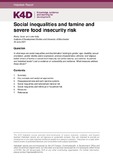| dc.contributor.author | Carter, Becky | |
| dc.contributor.author | Kelly, Luke | |
| dc.date.accessioned | 2021-07-12T12:24:53Z | |
| dc.date.available | 2021-07-12T12:24:53Z | |
| dc.date.issued | 2021-06-30 | |
| dc.identifier.citation | Carter, B., & Kelly, L. (2021). Social inequalities and famine and food insecurity risk. K4D Helpdesk Report. Institute of Development Studies. DOI: 10.19088/K4D.2021.097 | en |
| dc.identifier.uri | https://opendocs.ids.ac.uk/opendocs/handle/20.500.12413/16735 | |
| dc.description.abstract | This rapid review summarises the evidence on the ways in which social inequalities and discrimination affect the risk of famine or severe food insecurity. Looking at the risk at the national and sub-national level, gender and other horizontal inequities can affect a society’s risk of violent conflict and therefore food insecurity, while fragile livelihoods associated with ethnic marginalisation can impact regional food security. At the individual and household level, there is a lack of disaggregated data on people’s social characteristics and famines. There is a broader literature on the impact of systemic discrimination (based on gender, age, disability, sexuality, and ethnic identity) on individuals’ and households’ livelihoods and assets, thereby increasing their vulnerability to food insecurity. A key finding from the literature is the gender gap, with women more at risk of being food insecure than men. Also, some ethnic groups are highly vulnerable particularly in conflict-related famines; starvation is used as a warfare tactic in political and ethnic conflicts. There is evidence of how social inequalities heighten individuals’ risks during food crises and famines, including through exposure to protection threats, while limiting their access to essential services and humanitarian assistance. A broad range of measures seeks to address the multi-dimensional ways in which social inequalities affect vulnerability and resilience to food insecurity. | en |
| dc.description.sponsorship | FCDO (Foreign, Commonwealth and Development Office) | en |
| dc.language.iso | en | en |
| dc.publisher | Institute of Development Studies | en |
| dc.relation.ispartofseries | K4D Helpdesk Report;954 | |
| dc.rights.uri | https://www.nationalarchives.gov.uk/doc/open-government-licence/version/3/ | en |
| dc.subject | Children and Youth | en |
| dc.subject | Gender | en |
| dc.subject | Population | en |
| dc.subject | Rights | en |
| dc.subject | Security and Conflict | en |
| dc.subject | Social Protection | en |
| dc.title | Social Inequalities and Famine and Severe Food Insecurity Risk | en |
| dc.type | Helpdesk | en |
| dc.rights.holder | © Crown copyright 2021 | en |
| dc.identifier.doi | 10.19088/K4D.2021.097 | |
| dcterms.dateAccepted | 2021-06-30 | |
| rioxxterms.funder | Default funder | en |
| rioxxterms.identifier.project | Default project | en |
| rioxxterms.version | VoR | en |
| rioxxterms.versionofrecord | 10.19088/K4D.2021.097 | en |
| rioxxterms.funder.project | 9ce4e4dc-26e9-4d78-96e9-15e4dcac0642 | en |

